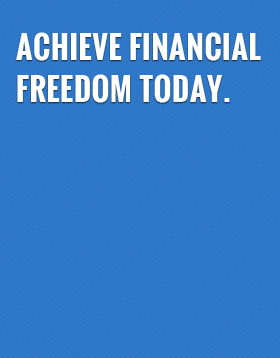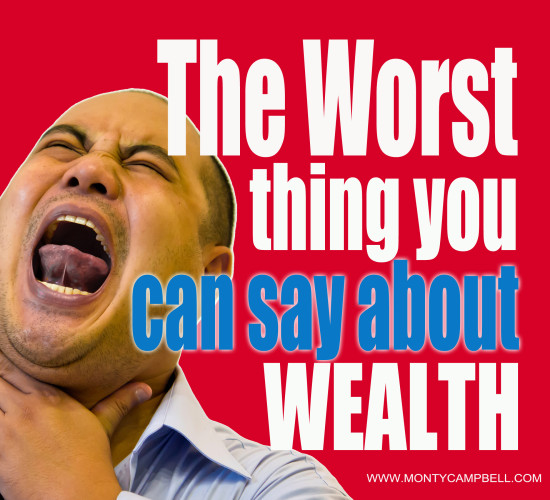I literally hate the phrase.
And I cringe every time I hear it.
And it’s said way too often in conversations about wealth.
By people who should know better.
But, they’re just repeating what they think is an innocuous phrase, not realizing that their words are completely poison.
What are these terrible words?
They’re this…
“I just want to be comfortable”
Gag.
There’s two problems with this statement. Let me take the first one – the adjective just . Unfortunately, the word ‘just’ has been hijacked lately by the mediocre. Instead of being used as it was intended to convey things that are proper, deserved and lawful, the word has become a crutch for those wanting to shirk responsibility.
Have you noticed more and more people are using the expression “I’m just saying” after making an off-putting remark or one that’s belies a more serious situation, conveniently absolving themselves of responsibility? This tagline, and it’s variants, is a handy conversational tool for the weak-minded and those who are intellectually lazy.
Chris Rock was famous for saying this about 24-hour ATM’s: “Nothing good is going to come from you withdrawing $400 from your checking account at 3:00 in the morning!” Similarly, nothing good is going to come from you using the word ‘just’ as a qualifier that reduces or eliminates your responsibility in matters of success. The person that says “I’m just trying…” or “I’m just doing the best I can…” is neither really trying or doing their very best. What they are doing, is seeking sympathy, hoping that the people around them will lower their standards and not hold them accountable. Gag again.
Don’t “just” do something. Either do it, or don’t
So, the first point in this post is this – remove the word ‘just’ from your vocabulary when used as a qualifier to lessen responsibility. As Yoda said to Luke Skywalker: “Try not! Do, or do not. There is no try.” Don’t ‘just’ do something. Either do it, or don’t do it. Don’t ‘just’ say something. Either say it (and own it) or don’t. Remember, there’s no trophy for ‘just’ doing something.
Before we move onto the next point about this statement, I wanted to give you a quick graph below on the power of words like ‘just’, relative to achieving success. Enjoy!
The second problem about the phrase “I just want to be comfortable” is this – In order to achieve what you haven’t done before, you have to get uncomfortable.
You see, it’s easy to fall into a pattern.
And I’m not saying there’s something wrong with routine. It’s great to have a system for success.
But you have to be careful. Sometimes, you can confuse being comfortable with being happy.
All too often, people find themselves living a life that doesn’t excite them. They stay were they’re at because they’re terrified of the alternative, but they don’t have the courage to start something new.
Our everyday routines can make us satisfied, but they can do something else to us as well – make us complacent. And it’s too late before we realize what’s happening.
After months, years and perhaps even decades, you wake up one day and don’t even know how you ended up there.
Though the differences between “happy” and “comfortable” can be slight, they’re very real.
Being happy means butterflies; being comfortable means regrets.
When you’re happy, you’re in a state of euphoria. And “euphoria” doesn’t mean unrealistic bliss. It just means your stomach flips every time you think about how good you have it. There’s a spark and an excitement that doesn’t die down, because that’s how happy you are.
Just Being Comfortable = Being Checked-Out
But when you’re comfortable, you go with things. You don’t question it. You’re not affected by where you are in life. You’re just checked out. You’re not precisely unhappy, but you’re not joyous, either. You simply… exist.
You see, relying on ambiguities like “I just want to be comfortable” to infer a less serious situation, is a sign of the mediocre. And we know what about the mediocre? They just want to get by.
So, how do you know if you’re happy or just comfortable?
Ask yourself this question…
Do you find yourself making decisions based on whether it will make your life easier or whether it will stretch you?
We are wired by years of evolution to naturally gravitate toward making our lives more comfortable. When faced with situations that offer the option to step outside of our comfort zone or to remain within it, unless we consciously act against our instincts, we are likely to take the route of least resistance.
What happens over time, though, if we never stretch beyond what is comfortable?
We get stuck.
The boundaries of the comfort zone get thicker and stronger the more often we assert them in our minds. Before long it’s not even a choice, we actually believe we’re not able to do things beyond the self-imposed barrier we have created to remain ‘comfortable’.
As Warren Buffett says, “The chains of habit are too light to be felt, until they are too heavy to be ignored”.
In other words, what started out as “comfortable” gradually becomes “uncomfortable”. You become trapped by the “comfort” while the dreams and aspirations you have are still eating away inside of you, unfulfilled.
Most people in these situations then try to make themselves comfortable again, with external stimulus from the material world. This is where things like binge spending and binge eating come from. You’ve heard of that classic country song “Looking for love in all the wrong places”? Well, this is like looking for happiness in all the wrong places!
You see, to be truly happy we need to be always stretching ourselves. Indeed, we feel most alive when we are in hot pursuit of goals that mean something to us. Even if it’s uncomfortable to begin with, doing something that matters causes us to meet the fear head on and peaks our senses. In short, we feel alive!
Self-Actualization Is What We Truly Want
Is it any surprise that the top of Maslow’s hierarchy of needs is self-actualization? “What a man can be, he must be.” This quotation forms the basis of the perceived need for self-actualization. This level of need refers to what a person’s full potential is and the realization of that potential. Maslow describes this level as the desire to accomplish everything that one can, to become the most that one can be. Notice that the phrase “to be comfortable” is not present in Maslow’s description!
Look, being happy means living; being comfortable means watching life happen around you. If you’re truly happy, you’re grabbing life by the horns. You’re living to the fullest, because every single day feels like an adventure. You embrace the thrill because you’re in love with what you’re becoming, and when you’re in love anything seems possible!
When you’re comfortable, you’re just letting the world pass by. You aren’t truly living, because you’re living inside of a vacuous bubble. You aren’t invested in your success; you’re just glad to exist.
I know what some of you may be saying – “Yes, but being comfortable is easy.”
Yes, being comfortable may not be nerve-racking. But living without happiness means settling. It means not allowing yourself to experience the most beautiful levels of human existence. Being happy may be “riskier” than seeking comfort, but it’s better than never risking anything — and therefore never truly living at all.
So, the moral of today’s essay is this – get comfortable being uncomfortable. Recognize it as a sign that you’re growing and learning. In fact, stepping out of a comfort zone can add energy and excitement to your life by stimulating new thought and creativity. Sure, you may feel self-conscious, nervous and even inadequate at times when you’re stretching, but do it anyway. For I firmly believe that all personal growth is dependent upon pushing the boundaries of your comfort zone.
Remember this, success is not just a goal, it’s bi-product. It’s a bi-product of being so uncomfortable with your current state of affairs that you take steps to change them.
Be free. Nothing else is worth it.
How to Watch Warren Buffett’s Berkshire Hathaway Annual Meeting
P.S. Many of you may be aware that Warren Buffett’s Berkshire Hathaway Annual Meeting is this weekend, and for the first time ever, it’s being streamed live! Buffett and his partner Charlie Munger kick off the show at 9 a.m. C.T.—that’s 10 a.m. in New York and 7 a.m. in Los Angeles—and will answer questions from a panel of interviewers as well as shareholders until 3:30 p.m. C.T.
Where can you watch? The Berkshire Hathaway annual meeting will be live streamed for free on Yahoo at this link. Enjoy!
Latest tweets from Monty!
“Want to stay stuck in life? Insist that you already know everything there is to know about you. You’ll never grow clinging to the old you.”
“Still dating yourself about wealth? Relying on ambiguities like “I just want to be comfortable” is a sign of mediocrity. Commit to freedom.”
“What do people who are financially free know that others don’t? The free know that tomorrow will be a reflection of what they do today.”
Want even more hard-hitting information about achieving financial freedom? Check-out these articles from the blog archives:
Infographic: The Real Way To Make Your First Million Dollars! Are You Ready To Be A Millionaire?
How To Avoid Being A Victim Of Financial Fraud…And One Victim’s Gut-Wrenching Story
If The American Dream Is Dead Mr. Clark, Then How Do You Explain Me?





